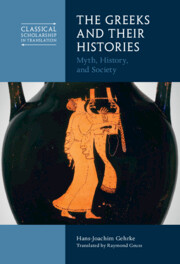Book contents
- The Greeks and Their Histories
- Classical Scholarship in Translation
- The Greeks and Their Histories
- Copyright page
- Contents
- Foreword
- Preface to the German Edition
- Preface
- Note on Abbreviations
- Introduction
- Chapter 1 The Locus of Intentional History
- Chapter 2 Greek Myths As a History of the Greeks
- Chapter 3 Greek Historiography between Past and Present
- Chapter 4 Greek Historiography between Fiction and Truth
- Concluding Perspectives
- References
- Index
Chapter 3 - Greek Historiography between Past and Present
Published online by Cambridge University Press: 01 December 2022
- The Greeks and Their Histories
- Classical Scholarship in Translation
- The Greeks and Their Histories
- Copyright page
- Contents
- Foreword
- Preface to the German Edition
- Preface
- Note on Abbreviations
- Introduction
- Chapter 1 The Locus of Intentional History
- Chapter 2 Greek Myths As a History of the Greeks
- Chapter 3 Greek Historiography between Past and Present
- Chapter 4 Greek Historiography between Fiction and Truth
- Concluding Perspectives
- References
- Index
Summary
Chapter 3 studies the beginnings of Greek historiography against the background of the intentional history described in the first two chapters. This clearly shows the innovative character of the new genre. The decisive factor for this was the influence of the new philosophical thinking that had initially developed in Ionia. The emphasis on rational procedures and the search for true knowledge was in the foreground, coupled with the curiosity of the researcher. The numerous stories of the Greeks were critically questioned by intellectuals of this provenance (e.g., Xenophanes, Hecataeus). Herodotus also felt obliged to the new rational-philosophical method, but at the same time he integrated many of the traditional stories into his new type of historical work. The critical direction then culminates in Thucydides, who in his own way and with the logic of power connects the present and the past. He was only too aware that he had strayed very far from traditional views of the past, and he himself underscored it very clearly.
- Type
- Chapter
- Information
- The Greeks and Their HistoriesMyth, History, and Society, pp. 73 - 94Publisher: Cambridge University PressPrint publication year: 2022

